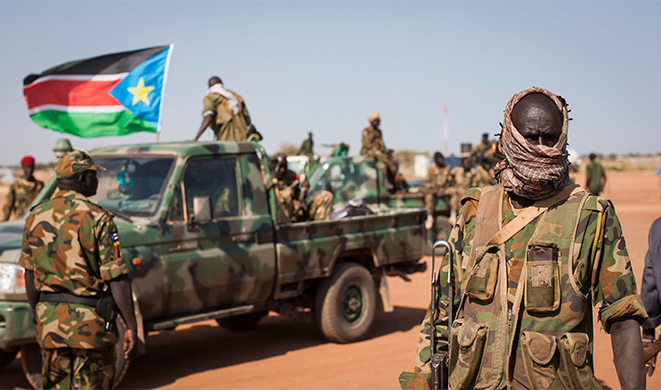
This op-ed was originally published by USA Today, and co-authored by George Clooney, co-founder of Not On Our Watch, and John Prendergast, co-founder of the Enough Project, who together created the Satellite Sentinel Project.
The only activity in the hospital compound in Bor, South Sudan, these days is the dozens of vultures circling overhead. In mid-January, rebel forces swept into the Bor hospital, killing everyone that could not escape. Underscoring its crime, the group collected and burned the bodies of its victims. All that remains are bloodstained shoes, charred medicine vials, and overturned wheelchairs. Scorched patches of earth show where people were set on fire. When local residents are asked who was responsible, the answer is always the same: child soldiers of a militia called the White Army.
In the 1980s and 1990s, tens of thousands of boys from the southern part of Sudan were driven from their homes and forced to trek hundreds of miles in search of sanctuary. Many were press-ganged into military service. They crossed two international borders, faced surreal life-threatening challenges, and eventually given asylum by the U.S. government, landing them in places like Phoenix, Atlanta, and D.C. They came to be known as the Lost Boys.
Today, renewed warfare in South Sudan is creating a new generation of Lost Boys. Two and a half years since winning its independence by way of a bloody, decades-long struggle strongly supported by the United States, rebel and government forces with their allied militias are recruiting young boys into their ranks. Merely two months into this new war, and at the direction of their "leaders," these boys have committed numerous atrocities. They have also borne witness to monumental crimes that will only deepen cycles of vengeance and child soldier recruitment.
Since we witnessed South Sudan's 2011 independence referendum, the children of the world's newest country have received no peace dividend. There are few social services provided by the state. In fact, some of the better educational opportunities — few and far between — have come from original Lost Boys who left careers in the U.S. to return to their beloved homeland and finance their own schools. One such school we visited was started by Valentino Deng Ajak, the inspiration for the main character of Dave Eggers' novel What is the What.
The state's failure to provide infrastructure, education, or a stable investment climate has meant that young South Sudanese have few opportunities.
Read the full op-ed on USA Today
Photo: A South Sudanese government soldier stands with others in Bentiu. (AP Photo/Mackenzie Knowles-Coursin)

